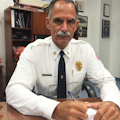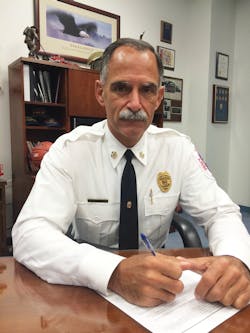Chief Concerns: The Choices We Make
Like mile-markers on the highway, the choices we make mark the directions we take. At the usual risk of being accused of “living in a glass house,” I fully recognize that none of us is perfect and none of our departments have “it” totally licked. My experiences with the Prince George’s County, MD, Fire/EMS Department (PGFD) were marked by successes and failures, each mapped by the decisions I and others chose.
It’s easy to trap yourself in the “that will never affect me” mentality. After all, that’s where most people are comfortable, thinking nothing bad will ever affect them. But reality will slap you in the face sooner or later, and your destiny to succeed (or fail) will be mapped by the choices YOU make.
Personal choices
As a young firefighter working my way through the ranks—first as a volunteer, then a dispatcher, then a paid firefighter/EMT—it was my conscious choice to learn each rank, each craft before moving on to the next. That accelerated over time as my knowledge and skill base expanded and other opportunities were presented. This was difficult coming up, as peer pressures in the fire service are real. It was a challenge to fend off the pressures of certain “rites of passage” thrust toward young firefighters, and I am convinced that one of the choices I made during this period molded my future more than any other—the choice to shy away from alcohol.
I was a non-drinker trying to work in a drinkers’ world; however, I was convinced that I could not become one of the statistics. As a volunteer, I picked up many of the 19 of my classmates who died in drunk-driving accidents. My choice to continue down the non-alcohol path set the course for the rest of my personal and professional life. I don't drink or smoke, use drugs—or even play golf. Instead, I get up every day about 3:30 a.m. and visit the gym five days a week at 5 a.m. I’m not saying this will work for you, but this is the path I’ve chosen to pursue.
People-watching
I am a people-watcher type of person. As chief, the choices you make are magnified by the people watching you. I challenge you to recognize the full weight of the responsibility you absorb when you put on those bugles. Your every move and every choice may have tremendous and/or devastating effects on your people and your communities.
Ethical choices are almost always aptly described as “doing the right thing, whether anyone is looking or not.” Unfortunately, many people allow the court of public opinion to cloud the definition of “right thing.” But you must be prepared to rise above THAT court and ensure that you are making the choices your people and your community need—choices that may not be exactly what they want.
Honing my people-watching skills has been a hallmark of my capacity to understand our communities and our firefighters, EMTs and paramedics on incident scenes. You will learn so much more if you just stop and observe what they're doing and listen to what they’re telling you. From the community advocate who just needs somebody to listen, to the captain who chooses to leave the firehouse on EVERY call in tennis shoes, to the paramedic who rudely pushes their way into a home and starts barking questions out—the choices made as a result of reflecting on those observations will affect everything you do.
People-watching as a civilian at the airport or on a walk is OK, but when you people-watch your firefighters and paramedics, I suspect you will observe the good and the bad. You need to be prepared to reward the good and to do something about the bad; just watching isn’t enough. And for the record, “doing something about it” does not mean that every choice made is a one-way street to heaven or hell. The path people take should be influenced by their other choices and how they react to other barriers thrown in their path. They need to CHOOSE whether to stay the course or to adjust direction and learn. Analyzing the effects each choice has is the “if this, then that” understanding that will help you and your members develop better moral and mental capacity. Sometimes it’s just the courageous choice to talk about the options that will make the difference.
Consciously or subconsciously, we are influenced by choices that OTHER people make, and it is important to recognize that because none of us are “God,” some of those choices will be beyond our control to change or influence. You will have to adapt, at least if that is the choice YOU make. It’s important to understand that many of the choices we make may ultimately be a choice of the lesser of two evils. These realistic choices are what many of our members make every day.
The immediate destiny of others’ decisions may not be within their view, so recognizing the wrong choice, compounded by other choices that could be career-ending moves, are choices people will need to learn how to navigate. This is certainly a place where you can really hone your people-watching skills. As a preacher’s kid, I was never really in “trouble” growing up. That reality, combined with watching other firefighters and paramedics face severe disciplinary processes, helped mold my choices. Ultimately, I chose to be ethically clean (as much as I possibly could) and to take advantage of every promotional opportunity I was eligible for. The rest is history.
Fire sprinkler advocacy
As I grew in the fire service, I chose to become, and continue to be, a strong advocate for sprinkler protection, public/community education, training and personal/organizational development. Much like every other chief, I have watched people working with me choose to follow and those working against me choose to drag along. The latter will continue to drag along until they choose to drop off or someone chooses to engage with them—choices, not mandates.
The effect of other people’s choices is very recognizable in our industry’s struggle to get residential sprinklers installed in every home. Sprinklers are simply a common-sense fire safety opportunity that should NOT be a choice. Unfortunately, many chiefs don’t (or won’t) advocate for residential sprinkler legislation—sometimes a choice they make, sometimes a choice thrust upon them by others.
I’ve heard all the excuses: “Chief, we can’t afford that …,” “Chief, I don’t have time to lobby our politicians …,” “Chief, I’m not allowed to talk to the elected officials …,” and probably most disheartening, “Chief, if we get sprinklers, I won’t be able to get anybody to come around because we won’t have any fires ….” We MUST make the choice to advocate for residential sprinklers and, yes, I’d LOVE to see a retro-requirement; however, I’m realistically pessimistic that such an animal will emerge during my lifetime.
The facts of residential sprinklers are irrefutable. In the 25-year history of mandatory sprinkler legislation in Prince George’s County, there have been thousands of residential fires and more than 150 residential fire fatalities. During the same period, there were more than 600 fires in sprinkler-protected homes. Zero fire fatalities occurred when a working sprinkler was present—ZERO! (Note: There have been two fatalities in residential structures protected by sprinklers, one where the water was turned off and pipes frozen, the other inside a non-sprinklered attached garage.)
Prince George’s County’s former fire chief, Jim Estepp, made the CHOICE to advocate for residential sprinkler requirements. Despite heavy lobbying against the legislation from the building industry and others, he CHOSE to push on and was successful in getting the legislation passed and fully enacted in 1992. The choices he made then, and the choices we made along the way to strengthen the legislation, have changed the lives of thousands within our ranks and our communities.
It is my choice to challenge YOU to not only advocate for the usual fire prevention and public education messages, but to also become sprinkler advocates within your organization and your communities.
I suspect we will constantly fight the other side of the argument, although why this is the case befuddles me. This is a choice the other side makes—a CHOICE that will kill more of us and those in our communities, unless we choose to intervene. There are many organizations to help steer you toward the right choice; the National Fire Sprinkler Association (NFSA) and the National Fire Protection Association (NFPA) are two of them.
Cancer risks
Choices aren’t always about the direction fire protection takes us. Cancer within our ranks is a serious threat to our longevity. The National Fallen Firefighters Foundation (NFFF) and several cancer advocacy groups continue to build momentum and highlight the courses of actions every individual should be taking—and courses of action that CHIEFS should be taking to protect their folks as well.
We’ll have to cover cancer further in a future article; however, it is clear that we have ignored the threat of carcinogens in our lives for far too long. Make the right choice now to get involved and advocate for your own folks and their families.
Smart choices
What choices have you made for your department and your community? Do you have a strong public/community presence? Do you educate people about fire safety, smoke alarms, sprinklers, escape planning and personal well-being? I fully recognize that there's a time and a place for both elected and internal politics, but that is certainly NOT when people in your ranks and within your communities are dying needlessly—at the hands of our choices.
About the Author

Marc S. Bashoor
MARC S. BASHOOR joined the fire service in 1981. In 2017, he retired as fire chief of Prince George’s County, MD, Fire/EMS, the largest combination department in North America. His progressive community-based approach led to record hiring and a strategic apparatus replacement plan.
Twitter: @ChiefBashoor
Email: [email protected]
